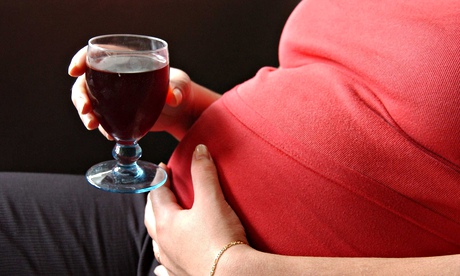
Children of mothers who drink as little as four units of alcohol in a day even once while pregnant are at greater risk of developing mental health problems and doing less well at school, new research claims.
The study found that the 11-year-old offspring of women who consumed the equivalent of two medium-sized glasses of wine in one session during pregnancy are more likely to suffer from hyperactivity and inattention.
The findings, from a British study of more than 4,000 children in the Bristol area, have reopened the debate about how much, if any, alcohol women should consume while carrying a child.
The Department of Health advised pregnant women and those trying to conceive to remain abstinent. "If they do choose to drink, to minimise the risk to the baby, they should not drink more than one to two units of alcohol once or twice a week and should not get drunk," said a DoH spokesman.
Academics found that 11-year-olds born in 1991-92 to mothers who had drunk that amount one or more times in pregnancy had "slightly higher" levels of hyperactivity and inattention, in the opinion of both their parents and their teachers, who each filled out questionnaires.
Girls seemed to display such behaviour more often than boys, the study found.
Among 7,000 children in the study, those affected by their mother's prenatal drinking scored on average one point lower in key stage 2 exams taken in their last year at primary school, according to an analysis of results.
The lead author of the research, Professor Kapil Sayal of Nottingham University, said: "Women who are pregnant or who are planning to become pregnant should be aware of the possible risks associated with episodes of heavier drinking during pregnancy, even if this only occurs on an occasional basis.
"The consumption of four or more drinks in a day may increase the risk for hyperactivity and inattention problems and lower academic attainment even if daily average levels of alcohol consumption during pregnancy are low."
However, children of women who had one drink a day while pregnant did not have any higher risk of either problem, Sayal and colleagues found.
The findings are from ongoing, long-term research called the Avon Longitudinal Study of Parents and Children, which looked at and followed the health of children born to mothers in Avon in 1991-92. They are published on Thursday in the journal European Child and Adolescent Psychiatry.
Belinda Phipps, chief executive of the parenting charity NCT, said better awareness of the risks meant far fewer mothers-to-be now drink more than they should compared to when the children in this study were born.
Phipps said: "According to the latest Infant Feeding Survey in 2010, only 3% of pregnant women reported drinking more than two units of alcohol per week on average, compared to 24% drinking four or more units a day at least once while they were pregnant in 1990-1992."
The director of the Institute of Alcohol Studies thinktank, Katherine Brown, said: "Exposure to alcohol can lead to foetal alcohol spectrum disorder, which manifests itself in a range of symptoms including hyperactivity, poor attention span and memory deficits, all of which can adversely impact on a child's ability to learn and socialise. So it's no surprise that this study found poor performance at school was linked to pre-natal drinking."
However, FASD gets little attention in the UK and there is "huge under recording" of how common it is, with symptoms often not picked up until children are at school and sometimes misdiagnosed, Brown added.
"Greater awareness is needed about the risks of drinking during pregnancy, with a clear message that no amount alcohol is safe. There also needs to be increased levels of support for those women who struggle to stop drinking due to dependency, and better diagnosis and treatment for babies with FASD," she said.
Professor Dame Sally Davies, the chief medical officer for England and government's chief scientific adviser, is currently reviewing guidelines on safe levels of drinking, including in pregnancy.

